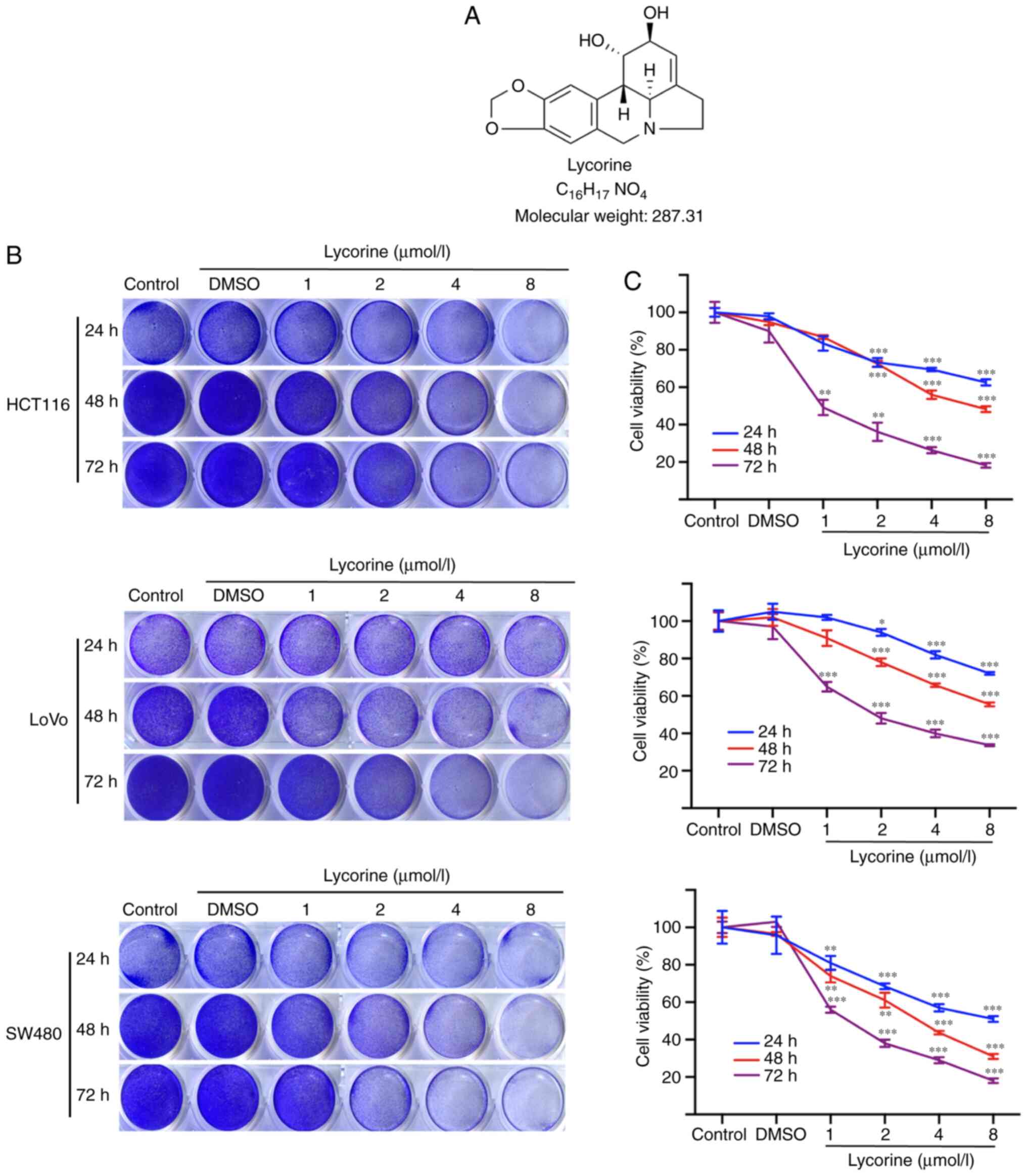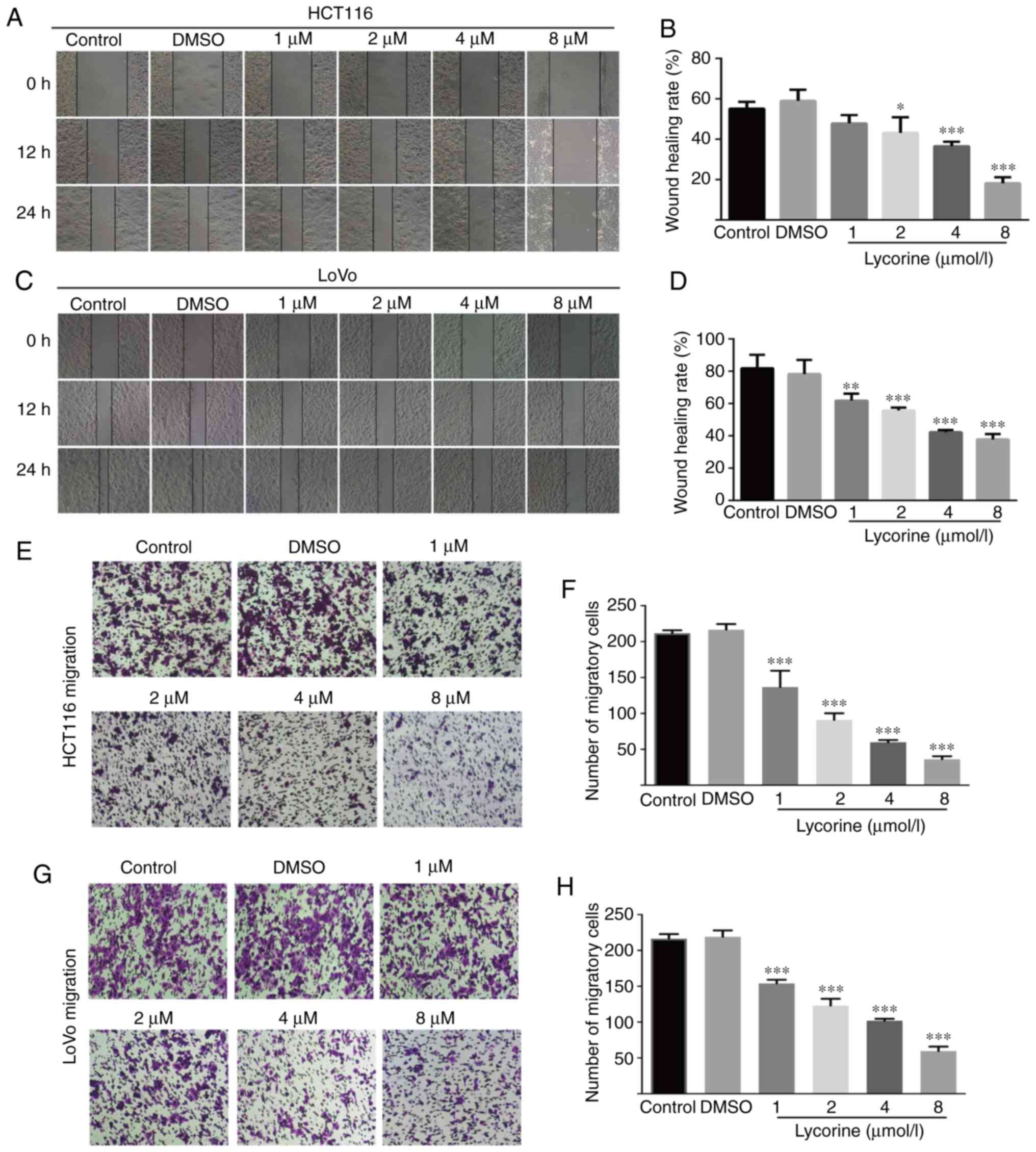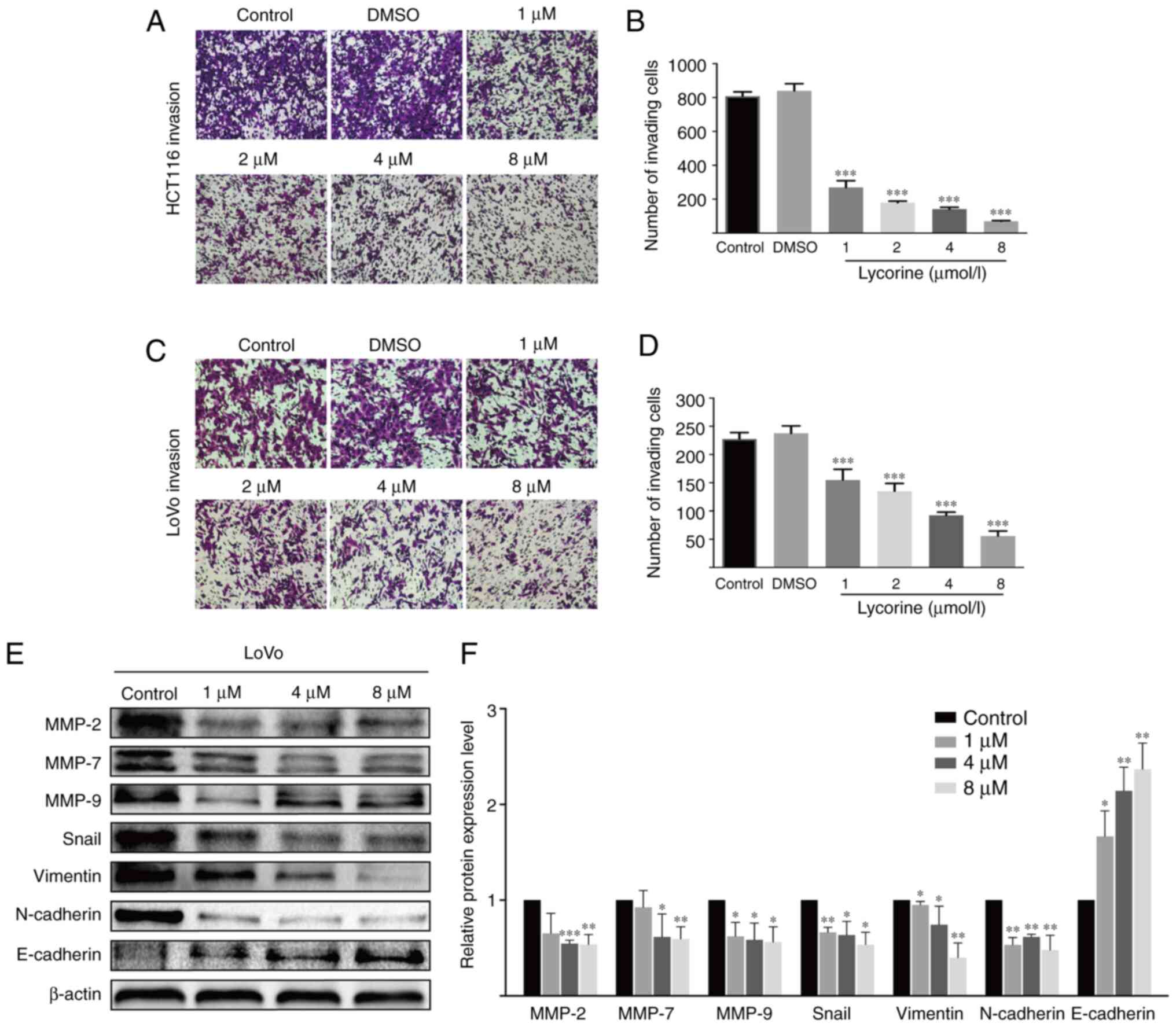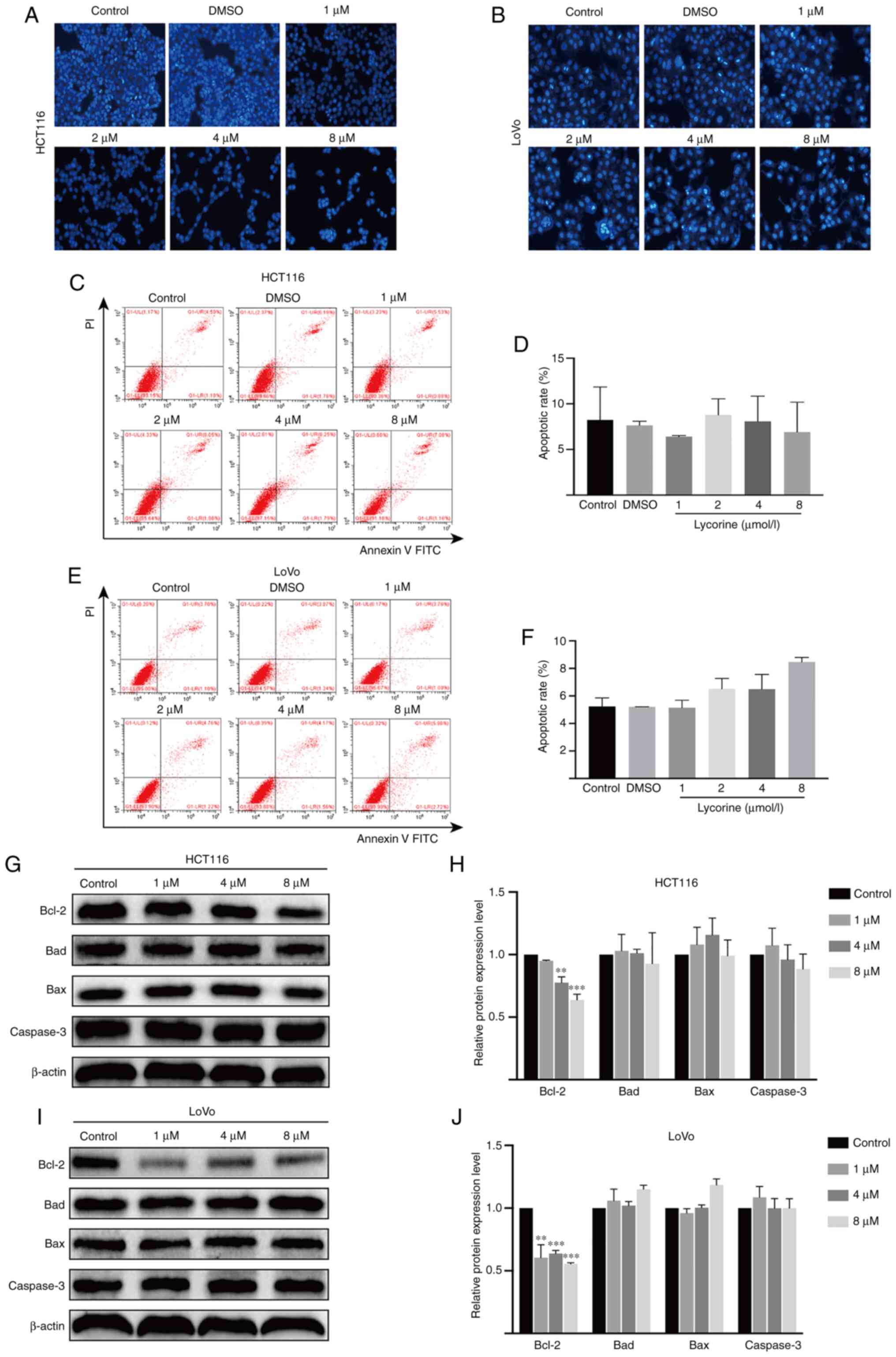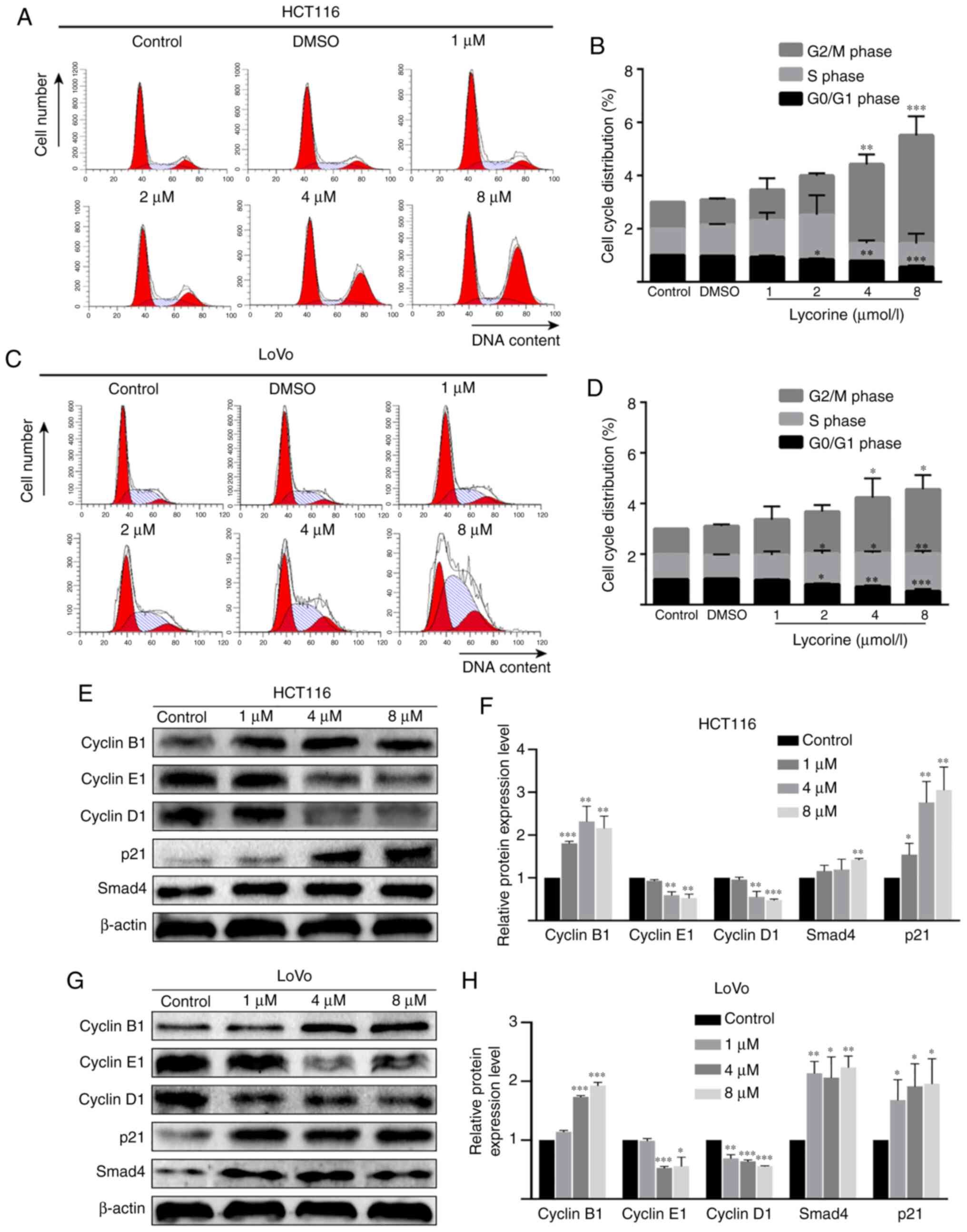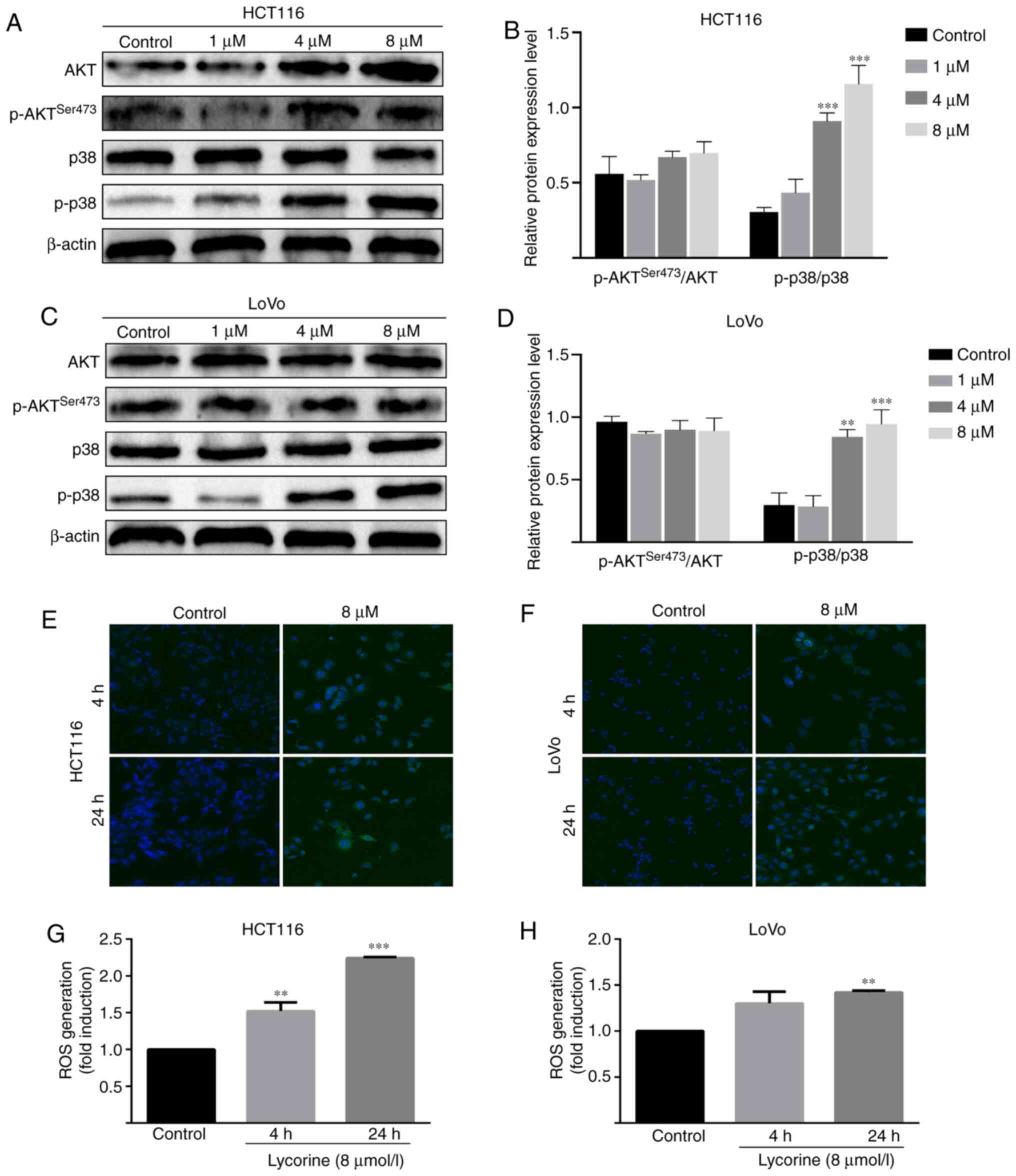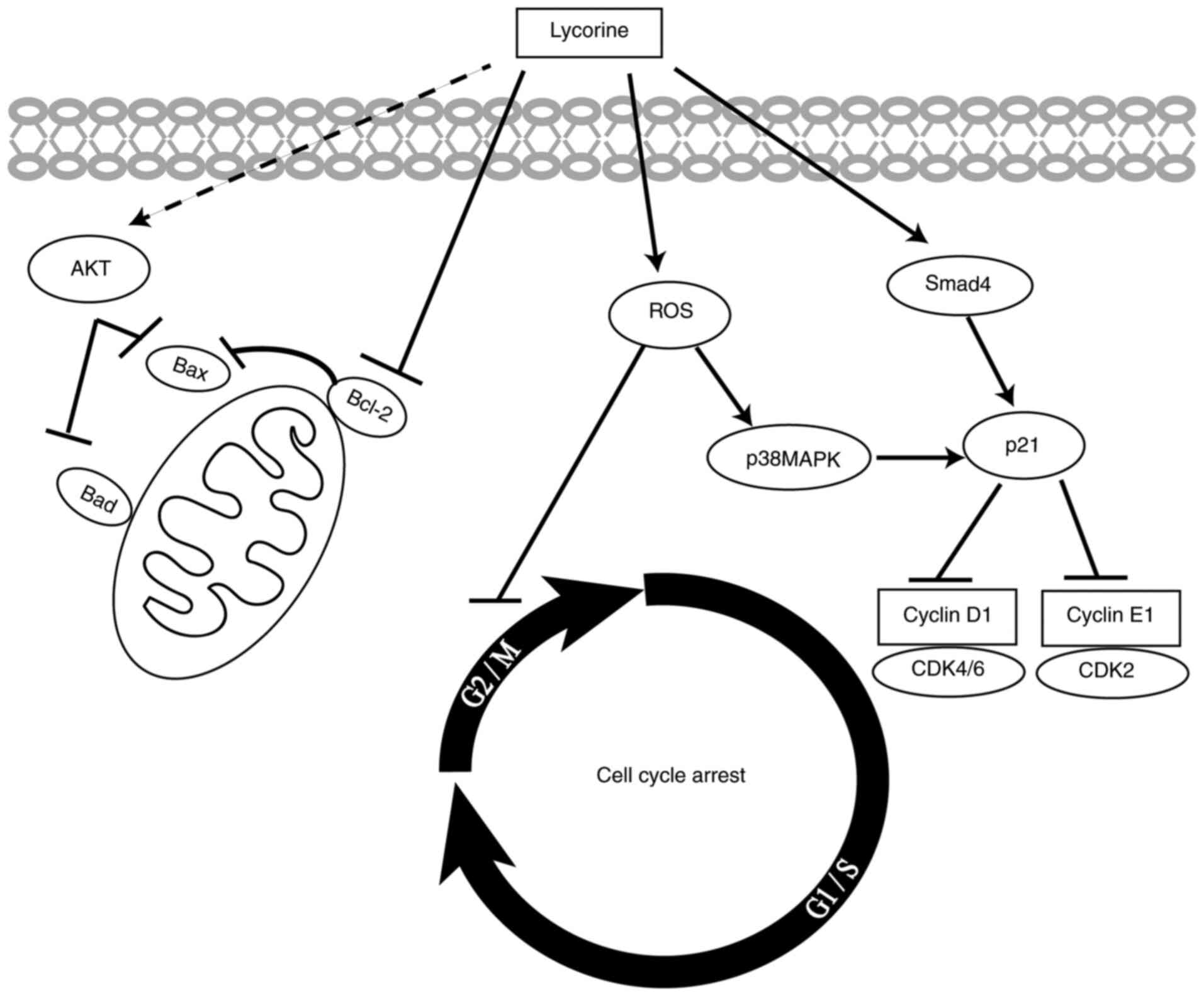|
1
|
Bray F, Ferlay J, Soerjomataram I, Siegel
RL, Torre LA and Jemal A: Global cancer statistics 2018: GLOBOCAN
estimates of incidence and mortality worldwide for 36 cancers in
185 countries. CA Cancer J Clin. 68:394–424. 2018. View Article : Google Scholar : PubMed/NCBI
|
|
2
|
Wild CP, Weiderpass E and Stewart BW:
2020, World Cancer Report. Cancer Research for Cancer Prevention
Lyon, France: International Agency for Research on Cancer;
http://publications.iarc.fr/586
|
|
3
|
Brenner H, Kloor M and Pox CP: Colorectal
cancer. Lancet. 383:1490–1502. 2014. View Article : Google Scholar : PubMed/NCBI
|
|
4
|
Mohammed AA, El-Tanni H, El-Khatib HM,
Mirza AA and El-Kashif AT: WITHDRAWN: Molecular classification of
colorectal cancer: Current perspectives and controversies. J Egypt
Natl Canc Inst. Jan 2–2016.(Epub ahead of print). doi:
10.1016/j.jnci.2015.11.004. View Article : Google Scholar : PubMed/NCBI
|
|
5
|
Kaya GI, Cicek D, Sarikaya B, Onur MA and
Somer NU: HPLC - DAD analysis of lycorine in Amaryllidaceae
species. Nat Prod Commun. 5:873–876. 2010.PubMed/NCBI
|
|
6
|
Luo Y, Roy M, Xiao X, Sun S, Liang L, Chen
H, Fu Y, Sun Y, Zhu M, Ye M and Liu J: Lycorine induces programmed
necrosis in the multiple myeloma cell line ARH-77. Tumour Biol.
36:2937–2945. 2015. View Article : Google Scholar : PubMed/NCBI
|
|
7
|
Wang C, Wang Q, Li X, Jin Z, Xu P, Xu N,
Xu A, Xu Y, Zheng S, Zheng J, et al: Lycorine induces apoptosis of
bladder cancer T24 cells by inhibiting phospho-AKT and activating
the intrinsic apoptotic cascade. Biochem Biophys Res Commun.
483:197–202. 2017. View Article : Google Scholar : PubMed/NCBI
|
|
8
|
Ying X, Huang A, Xing Y, Lan L, Yi Z and
He P: Lycorine inhibits breast cancer growth and metastasis via
inducing apoptosis and blocking Src/FAK-involved pathway. Sci China
Life Sci. 60:417–428. 2017. View Article : Google Scholar : PubMed/NCBI
|
|
9
|
Lamoral-Theys D, Andolfi A, Van
Goietsenoven G, Cimmino A, Le Calvé B, Wauthoz N, Mégalizzi V, Gras
T, Bruyère C, Dubois J, et al: Lycorine, the main phenanthridine
amaryllidaceae alkaloid, exhibits significant antitumor activity in
cancer cells that display resistance to proapoptotic stimuli: An
investigation of structure-activity relationship and mechanistic
insight. J Med Chem. 52:6244–6256. 2009. View Article : Google Scholar : PubMed/NCBI
|
|
10
|
Davis PK, Ho A and Dowdy SF: Biological
methods for cell-cycle synchronization of mammalian cells.
Biotechniques. 30:1322–1331. 2001. View Article : Google Scholar : PubMed/NCBI
|
|
11
|
Nieto MA, Huang RY, Jackson RA and Thiery
JP: EMT: 2016. Cell. 166:21–45. 2016. View Article : Google Scholar : PubMed/NCBI
|
|
12
|
Yuzhalin AE, Lim SY, Kutikhin AG and
Gordon-Weeks AN: Dynamic matrisome: ECM remodeling factors
licensing cancer progression and metastasis. Biochim Biophys Acta
Rev Cancer. 1870:207–228. 2018. View Article : Google Scholar : PubMed/NCBI
|
|
13
|
Berg KCG, Eide PW, Eilertsen IA,
Johannessen B, Bruun J, Danielsen SA, Bjørnslett M, Meza-Zepeda LA,
Eknæs M, Lind GE, et al: Multi-omics of 34 colorectal cancer cell
lines-a resource for biomedical studies. Mol Cancer. 16:1162017.
View Article : Google Scholar : PubMed/NCBI
|
|
14
|
Serrano-Gomez SJ, Maziveyi M and Alahari
SK: Regulation of epithelial-mesenchymal transition through
epigenetic and post-translational modifications. Mol Cancer.
15:182016. View Article : Google Scholar : PubMed/NCBI
|
|
15
|
Porter AG and Jänicke RU: Emerging roles
of caspase-3 in apoptosis. Cell Death Differ. 6:99–104. 1999.
View Article : Google Scholar : PubMed/NCBI
|
|
16
|
Meyers BM, Cosby R, Quereshy F and Jonker
D: Adjuvant chemotherapy for stage II and III colon cancer
following complete resection: A cancer care ontario systematic
review. Clin Oncol (R Coll Radiol). 29:459–465. 2017. View Article : Google Scholar : PubMed/NCBI
|
|
17
|
Lee CS, Ryan EJ and Doherty GA:
Gastro-intestinal toxicity of chemotherapeutics in colorectal
cancer: The role of inflammation. World J Gastroenterol.
20:3751–3761. 2014. View Article : Google Scholar : PubMed/NCBI
|
|
18
|
Zhang L, Xing X, Meng F, Wang Y and Zhong
D: Oral fluoropyrimidine versus intravenous 5-fluorouracil for the
treatment of advanced gastric and colorectal cancer: Meta-analysis.
J Gastroenterol Hepatol. 33:209–225. 2018. View Article : Google Scholar : PubMed/NCBI
|
|
19
|
Abdel-Rahman O: 5-Fluorouracil-related
cardiotoxicity; findings from five randomized studies of
5-fluorouracil-based regimens in metastatic colorectal cancer. Clin
Colorectal Cancer. 18:58–63. 2019. View Article : Google Scholar : PubMed/NCBI
|
|
20
|
Wang P, Yuan HH, Zhang X, Li YP, Shang LQ
and Yin Z: Novel lycorine derivatives as anticancer agents:
Synthesis and in vitro biological evaluation. Molecules.
19:2469–2480. 2014. View Article : Google Scholar : PubMed/NCBI
|
|
21
|
Winer A, Adams S and Mignatti P: Matrix
metalloproteinase inhibitors in cancer therapy: Turning past
failures into future successes. Mol Cancer Ther. 17:1147–1155.
2018. View Article : Google Scholar : PubMed/NCBI
|
|
22
|
Huang H: Matrix metalloproteinase-9
(MMP-9) as a cancer biomarker and MMP-9 biosensors: Recent
advances. Sensors (Basel). 18:32492018. View Article : Google Scholar
|
|
23
|
Bates RC and Mercurio AM: The
epithelial-mesenchymal transition (EMT) and colorectal cancer
progression. Cancer Biol Ther. 4:365–370. 2005. View Article : Google Scholar : PubMed/NCBI
|
|
24
|
Elmore S: Apoptosis: A review of
programmed cell death. Toxicol Pathol. 35:495–516. 2007. View Article : Google Scholar : PubMed/NCBI
|
|
25
|
Liu XS, Jiang J, Jiao XY, Wu YE, Lin JH
and Cai YM: Lycorine induces apoptosis and down-regulation of Mcl-1
in human leukemia cells. Cancer Lett. 274:16–24. 2009. View Article : Google Scholar : PubMed/NCBI
|
|
26
|
Liu J, Hu JL, Shi BW, He Y and Hu WX:
Up-regulation of p21 and TNF-alpha is mediated in lycorine-induced
death of HL-60 cells. Cancer Cell Int. 10:252010. View Article : Google Scholar : PubMed/NCBI
|
|
27
|
Siddiqui WA, Ahad A and Ahsan H: The
mystery of BCL2 family: Bcl-2 proteins and apoptosis: An update.
Arch Toxicol. 89:289–317. 2015. View Article : Google Scholar : PubMed/NCBI
|
|
28
|
Song G, Ouyang G and Bao S: The activation
of Akt/PKB signaling pathway and cell survival. J Cell Mol Med.
9:59–71. 2005. View Article : Google Scholar : PubMed/NCBI
|
|
29
|
Richards CE, Vellanki SH, Smith YE and
Hopkins AM: Diterpenoid natural compound C4 (Crassin) exerts
cytostatic effects on triple-negative breast cancer cells via a
pathway involving reactive oxygen species. Cell Oncol (Dordr).
41:35–46. 2018. View Article : Google Scholar : PubMed/NCBI
|
|
30
|
Goyeneche AA, Carón RW and Telleria CM:
Mifepristone inhibits ovarian cancer cell growth in vitro and in
vivo. Clin Cancer Res. 13:3370–3379. 2007. View Article : Google Scholar : PubMed/NCBI
|
|
31
|
Wempe SL, Gamarra-Luques CD and Telleria
CM: Synergistic lethality of mifepristone and LY294002 in ovarian
cancer cells. Cancer Growth Metastasis. 6:1–13. 2013. View Article : Google Scholar : PubMed/NCBI
|
|
32
|
Van Goietsenoven G, Andolfi A, Lallemand
B, Cimmino A, Lamoral-Theys D, Gras T, Abou-Donia A, Dubois J,
Lefranc F, Mathieu V, et al: Amaryllidaceae alkaloids belonging to
different structural subgroups display activity against
apoptosis-resistant cancer cells. J Nat Prod. 73:1223–1227. 2010.
View Article : Google Scholar : PubMed/NCBI
|
|
33
|
Malumbres M and Barbacid M: To cycle or
not to cycle: A critical decision in cancer. Nat Rev Cancer.
1:222–231. 2001. View Article : Google Scholar : PubMed/NCBI
|
|
34
|
Schafer KA: The cell cycle: A review. Vet
Pathol. 35:461–478. 1998. View Article : Google Scholar : PubMed/NCBI
|
|
35
|
Malumbres M and Barbacid M: Cell cycle,
CDKs and cancer: A changing paradigm. Nat Rev Cancer. 9:153–166.
2009. View Article : Google Scholar : PubMed/NCBI
|
|
36
|
O'Leary B, Finn RS and Turner NC: Treating
cancer with selective CDK4/6 inhibitors. Nat Rev Clin Oncol.
13:417–430. 2016. View Article : Google Scholar : PubMed/NCBI
|
|
37
|
Goel S, DeCristo MJ, McAllister SS and
Zhao JJ: CDK4/6 inhibition in cancer: Beyond cell cycle arrest.
Trends Cell Biol. 28:911–925. 2018. View Article : Google Scholar : PubMed/NCBI
|
|
38
|
Abbas T and Dutta A: p21 in cancer:
Intricate networks and multiple activities. Nat Rev Cancer.
9:400–414. 2009. View Article : Google Scholar : PubMed/NCBI
|
|
39
|
Zhao M, Mishra L and Deng CX: The role of
TGF-β/SMAD4 signaling in cancer. Int J Biol Sci. 14:111–123. 2018.
View Article : Google Scholar : PubMed/NCBI
|
|
40
|
Salovaara R, Roth S, Loukola A, Launonen
V, Sistonen P, Avizienyte E, Kristo P, Järvinen H, Souchelnytskyi
S, Sarlomo-Rikala M and Aaltonen LA: Frequent loss of SMAD4/DPC4
protein in colorectal cancers. Gut. 51:56–59. 2002. View Article : Google Scholar : PubMed/NCBI
|
|
41
|
Cuenda A and Sanz-Ezquerro JJ: p38γ and
p38δ: From spectators to key physiological players. Trends Biochem
Sci. 42:431–442. 2017. View Article : Google Scholar : PubMed/NCBI
|
|
42
|
Bonney EA: Mapping out p38MAPK. Am J
Reprod Immunol. 77:e126522017. View Article : Google Scholar
|
|
43
|
Martínez-Limón A, Joaquin M, Caballero M,
Posas F and de Nadal E: The p38 pathway: From biology to cancer
therapy. Int J Mol Sci. 21:19132020. View Article : Google Scholar
|
|
44
|
Handra-Luca A, Bendib M and Magkou C: P38
expression in colorectal adenomas: Relationships to cell
proliferation, stem phenotype and akt pathway proteins. Minerva
Gastroenterol Dietol. 66:208–210. 2020. View Article : Google Scholar : PubMed/NCBI
|
|
45
|
Moloney JN and Cotter TG: ROS signalling
in the biology of cancer. Semin Cell Dev Biol. 80:50–64. 2018.
View Article : Google Scholar : PubMed/NCBI
|















